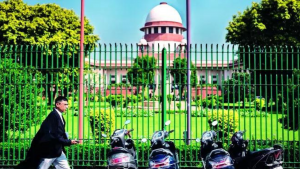Jammu and Kashmir’s Chief Minister, Omar Abdullah, found himself at the center of controversy after news surfaced of his morning walk with Union Minister Kiran Rijiju. The walk caused an uproar among opposition members in the assembly, particularly following the recent rejection of a motion to discuss the Waqf law introduced by Rijiju in Parliament. The incident has stirred heated debates and raised questions about the political implications of such encounters between leaders from different parties. The morning walk, initially seen as a casual and friendly interaction between the two politicians, has now become a subject of scrutiny and criticism. The opposition’s reaction in the assembly reflects the tensions and sensitivities surrounding the Waqf law and its implications for the region. The incident has also highlighted the complexities of political relationships and alliances in India’s ever-evolving political landscape. As discussions continue both inside and outside the assembly, the fallout from this unexpected encounter between Abdullah and Rijiju is likely to have far-reaching consequences. The incident serves as a reminder of the delicate balance of power and the intricate dynamics at play in the country’s political scene. Amidst the ongoing debates and controversies, all eyes are on how the involved parties will navigate the aftermath of this incident and its potential impact on the region’s political future.

Posted in
JUST IN
Omar Abdullah’s walk with Kiran Rijiju triggers opposition outcry after Waqf law discussion rejected in J&K assembly.
In Trend

Trump proposes US control and relocation of Gaza residents; Arab nations reject resettlement plan. France, Jordan, Egypt advocate Palestinian Authority control.



















